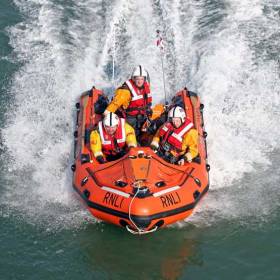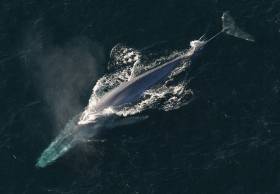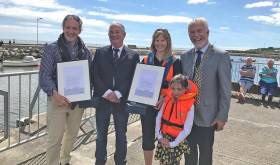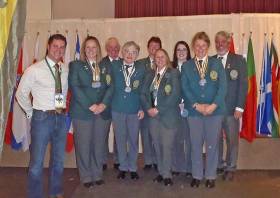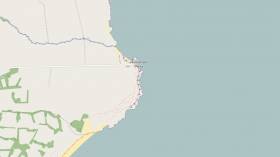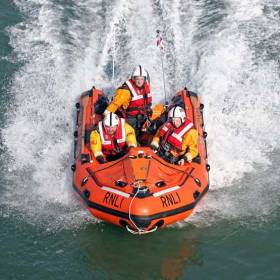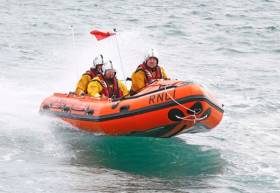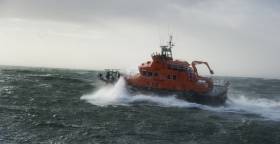Displaying items by tag: Wexford
Rowers Set for Coastal Rowing Championships
#Coastal Rowing: The inaugural Irish Coastal Rowing Championships will take place this Saturday and Sunday, August 18th and 19th at the National Rowing Centre in Farran Wood, Cork. Clubs from all four provinces are set to compete.
Eddie Farr, chair of the Coastal Championships Committee, said: “This is an incredibly proud moment in all our rowing lives, to at last get to row at our national and international rowing venue.”
The Championships, hosted by Rushbrooke Rowing Club, will see clubs race in over 30 different race categories, ranging from Under 12 to Masters, with race lengths ranging from 800 to 2,300 metres. Several thousand rowers and spectators are expected to attend the two day Championships.
The long-standing All Ireland Coastal Rowing Championships will also be held this weekend, from Friday to Sunday (August 17th to 19th) in Wexford. There will be an array of races in one-design Celtic boats, Currachs, East coast Skiffs, Wexford cots, Kerry four-oars, Donegal skiffs and Seine boats.
Man Saved By Wexford RNLI After ‘Hours’ Clinging To Quay Wall
#RNLI - A man who slipped into the water alongside Wexford Quay was rescued by Wexford RNLI after clinging to the quay wall for several hours.
The man, in his late 30s, was spotted by gardaí before 4am on Friday (22 December) and the lifeboat was quickly launched to their report.
Lifeboat volunteer crew member Frank O’Brien entered the water to lift the casualty into the lifeboat, as he was wedged between a trawler and the quay wall.
When on board, the crew administered casualty care and brought the man back to Wexford lifeboat station, where an ambulance then took him to hospital for further treatment.
The man was said to be “extremely grateful” to the gardaí and lifeboat crew, and said it felt like he had been in the water for several hours.
Wexford RNLI urges people to respect the water and be vigilant when walking near the water's edge. If you see someone in difficulty, ring 999/112 and ask for the coastguard.
London Museum’s Wexford Blue Whale Skeleton Is The Real Deal
#MarineWildlife - The skeleton of a blue whale beached on the Wexford coast in the late 19th century has now taken pride of place at London’s Natural History Museum.
As previously reported on Afloat.ie, the museum paid the equivalent of €30,000 for the carcass of the giant marine mammal that washed up in Wexford Harbour in 1891.
The specimen was subsequently rendered at the museum’s own ‘whale pit’, which operated till the 1940s, and its skeleton was put into storage for decades.
That’s until the museum’s directors decided that a new display in its grand entrance hall would help reposition the institution as one that puts first the conservation of today’s natural world, according to the Guardian.
In short, that meant saying goodbye to Dippy, the famous diplodocus skeleton that is actually a cast of a dinosaur fossil found in the United States — and welcoming a more local but more importantly awe-inspiring and authentic example of life that exists on this planet today.
Hanging the new attraction was no mean feat, however, as The Telegraph reports how a crucial bolt was sheared off in the middle of hoisting the 4.5 tonne beast in the museum’s Hintze Hall.
#RNLI - Two volunteer lifeboat crew with Wexford RNLI have received the charity’s Excellence in Volunteering Award in recognition for their hard work and dedication to lifesaving.
Lorraine Galvin and David Maguire were presented with their framed certificates during the Wexford Maritime Festival, the hugely popular event the pair helped set up, over the weekend of 1-2 July.
In a citation from the RNLI’s chief executive Paul Boissier, he explained the award was in recognition for David and Lorraine’s “vision in founding the Wexford Maritime Festival back in 2012” and their “drive and energy in continuing to manage and run the festival”.
Boissier went on to praise them for the building of links with other rescue and blue light organisations and for raising awareness of the work of the RNLI.
Welcoming the award, Wexford RNLI lifeboat operations manager Nick Bowie said: “We are very proud of Lorraine and David at the lifeboat station. They take their lifesaving role in the community very seriously and their enthusiasm is infectious.
“Volunteering to be on the lifeboat crew is a huge commitment but to then go on and set up the festival to promote water safety and bring visitors to our town is incredible.”
The Wexford Maritime Event promotes having fun on the water safely and raises funds for the work of the RNLI. It has become one of the largest annual events held in the South East.
RNLI area lifesaving manager Owen Medland commented: “David and Lorraine have demonstrated the very highest level of volunteering both operationally and with their involvement with the Wexford Maritime Festival since its inception. Their energy, enthusiasm and professionalism is contagious.
“Both volunteers are fully deserving of this recognition and we are truly grateful for all they contribute to the saving of lives.”
Declan Geoghegan, SAR operations manager with the Irish Coast Guard, added: “In the many SAR incidents Lorraine and David have been involved in, they have been known for their dedication and dependability in all aspects. They are professional in all aspects of their work.
"The coastguard would like to congratulate Lorraine and David on this well deserved reward.”
Gold Times Two For Irish Teams At Shore Angling Worlds
#Angling - It was double gold for Ireland’s men and women at the World Shore Angling Championships in Wexford this week, as the Irish Examiner reports.
And it’s a result that’s put the sport of shore angling firmly “back on the map” in Ireland, according to the Irish Federation of Sea Angling’s Brian Reidy.
Top prize for the men’s team saw them leap up two spots from their bronze-medal finish at last year’s event in Portugal’s Algarve, their best placed finish since winning in 2010 (they also came third in 2012).
But it was an even more impressive outing by the Irish women’s team, who were competing for the first time ever at top level and held on to their early lead for the full week’s fishing.
The Belfast Telegraph profiled the team ahead of the competition, noting that it was a family affair: mother and daughter Janet Snoddy and Lisa Gormley cast their lines as part of the six-women squad, while Lisa’s father — and Janet’s husband — Jim Gormley served as team manager.
Search Resumes For Missing Fisherman Off Wicklow-Wexford Border
#Missing - The search was set to resume this morning for a fisherman missing after going overboard from a three-man fishing vessel off the Wicklow-Wexford border yesterday morning (Wednesday 16 November).
As The Irish Times reports, RNLI lifeboats from Rosslare and Wicklow were tasked along with the Waterford-based Irish Coast Guard helicopter Rescue 117 and later Rescue 116 from Dublin Airport to the incident some 6km east of Kilmichael Point in Co Wexford.
It's understood that the missing man is in his late 40s or eary 50s, according to BreakingNews.ie.
#RNLI - A visiting yacht which ran aground on the way into Wexford Harbour was rescued by Wexford RNLI on Thursday afternoon (7 July) in what was the third callout for the volunteer crew this week.
The previous evening, the lifeboat launched at 8.15pm to reports of a walker on rocks near Wexford Bridge by members of Wexford Marinewatch who were concerned for their safety.
The lifeboat made its way to the wall which immerses in high tide and stood by until the individual was safely back on dry land.
On Tuesday (6 July) the lifeboat launched to reports of a possible sighting in the water, described as a white object that was splashing near Ferrycarrig Hotel. An extensive search of the area was carried out with nothing found.
Speaking after the week’s missions, Wexford RNLI volunteer lifeboat press officer Lorraine Galvin said: "All our volunteers are on call 24 hours a day, seven days a week and typically launch the lifeboat under 10 minutes of a 999 call.
"With at least two training exercises a week, the volunteers commit a great amount of time to providing rescue cover from Killurin Bridge to Curracloe Beach.
"We would also like to thank the fundraisers, who are all volunteers for their recent Flag Day collection and all those who donate to the RNLI to keep the service going allowing us to continue to saves lives at sea."
#RNLI - Four local towns went head-to-head at a recent quiz night in a bid to raise funds for Fethard RNLI’s new inshore lifeboat appeal.
Some 62 tables took on the challenge in four venues in Fethard on-Sea, Duncannon, Campile and New Ross last Friday (1 April) to determine which village or town would take the ‘Don’t be a fool on April Fool’s Day’ crown.
The honours went to New Ross on the night, with the winning team represented by Luke Grennan, Dan Meaney, Pat Kenny and Denis North.
Speaking following the event, Fethard RNLI fundraising chair Oonagh Hearne said: "Around 248 people enjoyed a great family evening with 62 tables participating and helping us to raise €3,000 towards our new inshore lifeboat appeal.
"Thank you to everyone who supported the event including The Brandon House Hotel, Neville’s Bar, Dunphy’s Bar and the Strand Tavern. Thanks to everyone who took part, the companies who donated prizes and all who helped organise the event. The community spirit was incredible."
Fethard RNLI hopes to raise €65,000 in their 18-month fundraising appeal which will go towards the cost of a new D class lifeboat due to arrive at the station late next year.
Two fishermen have been brought to safety this afternoon by the RNLI after they got into difficulty off the Wexford coast.
Wexford RNLI was requested to launch their inshore lifeboat at 12.08pm following a report that a fishing vessel with two people on board was experiencing mechanical difficulty a mile and a half south east of Blackwater Head.
The lifeboat helmed by Frank O’Brien launched and made its way to the scene. Wexford RNLI then requested the assistance of Rosslare Harbour RNLI due to the location of the fishing vessel some 12 miles north of Rosslare Harbour. It was the fourth call out in a week for the volunteer lifeboat crew from Rosslare.
The all-weather lifeboat under Coxswain Eamonn O’Rourke and with eight volunteer crew members on board launched at 12.29pm and made its way to the scene.
Weather conditions at the time were described as overcast but good. The men had been razor fishing when their boat got caught in lobster pots.
Once on scene, the lifeboat crew observed that no one was in immediate danger and began to work with the fishermen to establish a towline.
The vessel was then taken under tow and brought to the bar of Wexford escorted all the time by Wexford RNLI’s inshore lifeboat. Once there, Wexford RNLI took over and brought the vessel to shore at 4pm with the assistance of another fishing vessel which was in the area at the time. Having only finished a routine exercise when they were requested to launch at midday, this meant the volunteers from Wexford had spent some six hours at sea.
Meanwhile, yesterday (Saturday 12 March) Rosslare Harbour RNLI’s all-weather lifeboat under Coxswain Keith Miller launched in thick fog at 7am after a fishing boat with three people on board was reported to have lost its rudder just off Rosslare. The lifeboat once on scene took the boat under tow and brought it to Blackrock where it was met by Kilmore Quay RNLI’s all-weather lifeboat which towed it into Kilmore Quay.
Meanwhile, at 6.30am on Thursday, the lifeboat launched under Coxswain Eamonn O’Rourke to go the assistance of a fishing boat which had broke from her moorings overnight and blew ashore due to a change in the weather conditions. On this occasion the lifeboat crew established a tow before the vessel was brought alongside the fishermen’s wall in the harbour.
Speaking following today’s call out, David Maloney, Rosslare Harbour RNLI Lifeboat Operations Manager said: ‘The fishermen did the right thing this afternoon and raised the alarm when they began to experience some difficulty. Our volunteers both from Rosslare Harbour and Wexford responded rapidly and worked well together to bring the fishermen safely to shore. It has been a busy week for our volunteers but they are always ready and delighted to help anyone in need at sea.’
Wexford Lifeboat Rescues Man Within Minute Of Entering Water
#RNLI - Wexford RNLI's volunteer lifeboat crew rescued a man within a minute of him entering the water near Wexford Bridge on Wednesday afternoon (28 October).
The boat was just about to launch for an assessment of two prospective crew members when shore crew and tractor driver David Dempsey spotted something falling into the water out of the corner of his eye.
The lifeboat continued to launch at 2:33pm and was on scene within one minute. In the meantime a member of the public had thrown a lifebouy into the water and the casualty was able to hold onto it.
He was quickly recovered into the lifeboat at 2.34pm and the boat was back at the lifeboat station at 2.35pm, where the casualty was treated for mild hypothermia. Ambulance personnel provided further treatment and brought him to hospital.
Wexford RNLI volunteer lifeboat press officer Lorraine Galvin said: "The fact that the lifeboat was ready to launch and was there within a minute of the man falling into the water saved his life, [not to mention] the fast response by a member of the public who threw a ringbouy into the water.
"The two volunteer lifeboat crew who were on assessment at the time had the opportunity to put their training to the test in a real rescue scenario."
The lifeboat crew involved in this rescue were helm Frank O'Brien and Fintan O'Donoghue, trainee crew Ger Doran and Marcin Maksimiuk, and tractor driver David Dempsey.


























